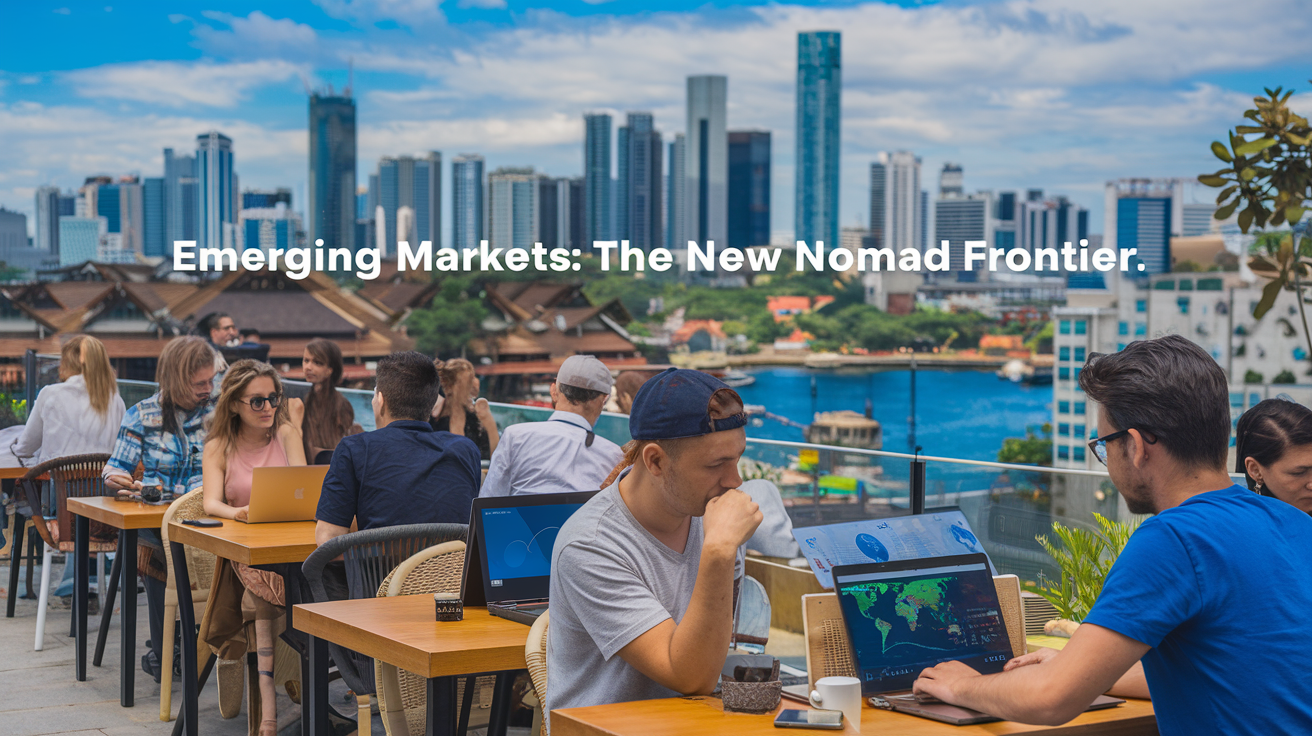Emerging Market Opportunities
As the calendar turns to mid-2025, the digital nomad landscape is undergoing a remarkable transformation. Traditional hotspots like Bali, Chiang Mai, and Lisbon—once the darlings of location-independent professionals—are facing challenges from rising costs and local resistance.
Meanwhile, a new constellation of emerging markets is rising to prominence, offering fresh opportunities for the savvy nomadic investor. From Kenya’s booming tech scene to Brazil’s vibrant urban centers, these destinations are not just places to work remotely—they’re becoming fertile ground for investment and wealth creation.
The numbers tell a compelling story: with an estimated 40 million digital nomads worldwide seeking new horizons, countries like Mexico, Georgia, and Vietnam are responding with enhanced digital infrastructure, innovative visa programs, and competitive living costs.
This shift isn’t merely geographical—it represents a fundamental realignment of global investment flows. As nomads migrate to these emerging markets, they bring capital, expertise, and connections that can transform local economies and create unprecedented opportunities for early movers.
But with opportunity comes complexity: internet reliability, political stability, and regulatory frameworks vary widely across these new frontiers. 🚀📊
In this exploration of emerging market opportunities, we’ll journey through Africa’s rising tech hub in Kenya, examine the investment potential in Latin American powerhouses Brazil and Mexico, uncover growing markets across Asia, and spotlight alternative European and African destinations that deserve your attention.
Whether you’re a seasoned nomadic investor or considering your first international venture, understanding these shifting dynamics could be the key to unlocking your next successful investment. Let’s dive into the new geography of opportunity that’s reshaping how location-independent professionals build wealth in 2025.
The Shifting Landscape of Digital Nomad Destinations
A. Rising costs and local resistance in traditional hotspots (Bali, Chiang Mai, Lisbon)
Traditional digital nomad hotspots are experiencing significant challenges in 2025. Cities like Bali, Chiang Mai, and Lisbon have become increasingly overcrowded, triggering substantial price increases and growing resistance from local communities.
This overcrowding has prompted many nomads to seek alternatives that offer better value and more authentic experiences, with emerging destinations rapidly gaining popularity.
B. Key factors driving nomads to emerging markets
Several key factors are pushing digital nomads toward emerging markets. Countries in Asia, South America, and Africa are actively implementing nomad-friendly policies with innovative visa programs. Nations like Kenya, South Africa, and El Salvador are enhancing digital infrastructure while offering unique cultural experiences.
The perception of nomads has also evolved from budget backpackers to financially stable professionals, with many destinations now specifically targeting high-earning remote workers who can contribute meaningfully to local economies.
C. Global digital nomad population statistics and trends
The digital nomad landscape is undergoing a profound transformation in 2025. Statistical trends show a notable decline in interest in European destinations while regions like Asia, Latin America, and Africa experience substantial growth. This shift reflects changing priorities among nomads who increasingly value authentic cultural immersion and community integration.
Rural digital nomadism has emerged as a significant trend, with many professionals seeking experiences outside urban centers. Governments worldwide are now incorporating digital nomad programs into broader economic strategies, recognizing these mobile professionals as valuable contributors to local development.
With these shifting dynamics in the digital nomad ecosystem creating new investment opportunities, let’s examine how African markets are positioning themselves at the forefront of this transformation, particularly Kenya’s impressive rise as an investment frontier for nomadic investors.
African Investment Frontiers: Kenya’s Rise
As the landscape for digital nomads continues to evolve, Kenya has emerged as a significant frontier for nomadic investors in Africa. The introduction of the Class N-Digital Nomad Permit by President William Ruto in October 2024 marks a strategic initiative to position Kenya as a hub for international talent and investment.
This new visa allows remote workers with a minimum annual income of $24,000 to reside in Kenya while working for companies outside the country.
Nairobi’s thriving startup ecosystem
Nairobi has developed into a vibrant center for entrepreneurship, attracting both local and international investment. The capital city offers a unique blend of urban innovation and cultural experiences, making it increasingly attractive for nomadic investors seeking emerging market opportunities.
Kenya’s strategic focus on becoming a premier destination for remote professionals is evidenced by its ambitious goal to attract five million visitors annually by 2027.
Digital infrastructure improvements
Kenya’s appeal as a digital nomad destination is significantly enhanced by its advanced digital infrastructure and connectivity. These improvements have created a conducive environment for remote work, allowing professionals to maintain productivity while enjoying Kenya’s distinctive work-life balance. The government’s commitment to digital advancement continues to strengthen Kenya’s position in Africa’s evolving digital economy.
Challenges outside urban centers
Despite the promising developments in urban areas, nomadic investors should be aware of infrastructure challenges that persist outside major cities. Power outages remain a significant concern in rural regions, potentially disrupting remote work capabilities. Investors considering ventures beyond Nairobi should factor in these reliability issues when planning their investment strategies and work arrangements.
Now that we’ve examined Kenya’s rise as an investment frontier in Africa, let’s turn our attention to Latin American Opportunities, where Brazil and Mexico present their own unique possibilities for nomadic investors seeking diversification in emerging markets.
Latin American Opportunities: Brazil and Mexico
Now that we’ve explored Kenya’s investment landscape, let’s turn our attention to Latin America’s emerging opportunities. Brazil and Mexico stand out as compelling destinations for nomadic investors seeking diversification in 2025.
Brazil’s vibrant culture and tech improvements in Rio and São Paulo
Brazil offers nomadic investors a unique blend of investment potential and lifestyle appeal. São Paulo and Rio de Janeiro have emerged as tech hubs with improving digital infrastructure, making remote work increasingly viable.
With high-speed internet widely available in urban centers, these cities provide the connectivity essential for digital nomads. The cost of living varies significantly, with accommodations ranging from $300-$600 monthly for budget options to over $1,200 for premium residences. Co-working spaces are abundant, charging between $10-$20 daily or $100-$300 monthly, providing professional environments for networking and productivity.
The country’s 2025 Digital Nomad Visa program, allowing stays up to two years, has positioned Brazil as an attractive long-term option for location-independent professionals. Beyond work considerations, Brazil’s cultural richness offers investors an immersive experience, with vibrant nightlife, diverse culinary scenes, and world-renowned festivals.
The natural landscape, from Amazon rainforests to coastal beaches, provides weekend exploration opportunities that few countries can match. While Portuguese remains the primary language, English proficiency in business districts continues to improve, reducing communication barriers for international investors.
Mexico’s accessibility for North American investors
Mexico presents compelling advantages for North American investors, particularly those based in the United States and Canada. Its geographic proximity dramatically reduces travel times and costs compared to other emerging markets. This accessibility proves invaluable for nomadic investors who maintain business ties or family connections in North America. Mexico’s time zone alignment with the U.S. facilitates real-time communication with North American partners and clients, eliminating the coordination challenges often faced when investing in more distant regions.
The country’s investment landscape offers favorable conditions for nomadic professionals. While the reference content doesn’t provide specific details about Mexican investment opportunities, the country’s strategic location positions it as a gateway between North and South American markets.
For nomadic investors seeking emerging market exposure with reduced logistical complexities, Mexico’s accessibility represents a significant competitive advantage over more distant investment frontiers.
Established nomad communities in Mexico City and Playa del Carmen
Mexico has cultivated some of Latin America’s most robust digital nomad communities, with Mexico City and Playa del Carmen emerging as primary hubs. These established networks provide invaluable support systems for nomadic investors, offering local market insights, professional connections, and social integration opportunities that would otherwise take months or years to develop independently.
The concentration of international professionals in these locations has sparked a corresponding growth in nomad-friendly infrastructure, including reliable high-speed internet, flexible workspace options, and bilingual service providers.
Mexico City appeals to urban-oriented investors with its cosmopolitan atmosphere, cultural institutions, and business opportunities. Meanwhile, Playa del Carmen attracts those seeking a balance of professional productivity and coastal lifestyle.
The presence of seasoned nomads in these communities creates natural mentorship opportunities for newcomers navigating Mexico’s investment landscape. As these communities continue maturing through 2025, they increasingly function as unofficial incubators for cross-border ventures and investment collaborations.
With Latin America offering these diverse opportunities, our attention now turns to Asian Markets with Growing Potential, where different economic dynamics and cultural contexts present alternative pathways for the globally-minded nomadic investor.
Asian Markets with Growing Potential
Now that we’ve explored the investment landscapes of Brazil and Mexico, let’s turn our attention to Asia’s emerging markets that offer promising opportunities for nomadic investors. Asia continues to evolve with diverse investment environments across several countries, each presenting unique advantages for remote investors seeking growth potential in 2025.
Bali’s Evolution with New Visa Options Despite Rising Costs
Bali remains a perennial favorite among digital nomad investors, though the landscape has changed significantly. While costs have risen notably in popular areas like Canggu due to increased tourism pressure, the Indonesian government has responded by introducing new visa options specifically targeting remote workers.
These visa innovations allow nomadic investors to establish longer-term presences, creating opportunities for more sustainable investment strategies in local businesses and real estate. Despite the higher expenses compared to previous years, Bali’s robust infrastructure, numerous coworking spaces, and vibrant expat community continue to make it an attractive hub for investment operations in Southeast Asia.
Da Nang, Vietnam’s Affordable Beach Lifestyle
While many nomadic investors focus on Vietnam’s bustling Ho Chi Minh City or historic Hanoi, Da Nang has emerged as a compelling alternative offering exceptional value. This coastal city combines affordability with an enviable beach lifestyle that few investment destinations can match. Da Nang provides significantly lower living costs than Western countries while delivering high-quality amenities, reliable internet connectivity, and growing coworking options.
For nomadic investors seeking to maximize operational efficiency while maintaining quality of life, Da Nang’s cost advantages create favorable conditions for bootstrapping new ventures or allocating capital toward investments rather than overhead expenses.
Taipei, Taiwan’s New Digital Nomad Visa
Taipei has strengthened its position as a premier destination for nomadic investors with the introduction of its digital nomad visa program. Ranked 14th globally among digital nomad cities, Taiwan’s capital offers a compelling blend of advantages: friendly locals, exceptional public transportation, and a thriving tech ecosystem that provides natural networking opportunities for investment activities.
The city balances urban sophistication with proximity to natural beauty, while its strong technological infrastructure supports investors who require reliable connectivity and modern facilities. The new visa program enables longer stays, allowing nomadic investors to develop deeper market insights and more meaningful business relationships within Taiwan’s dynamic economy.
Siargao, Philippines as an Emerging Surfing-Oriented Community
For nomadic investors seeking opportunities in less-developed markets with significant growth potential, Siargao represents an intriguing frontier. This Philippine island, primarily known for its world-class surfing, has begun attracting a distinctive community of digital nomads drawn to its laid-back lifestyle and natural beauty. While Cebu remains the country’s established digital nomad center with more developed co working infrastructure, Siargao offers early-mover advantages for investors willing to navigate its developing digital ecosystem.
The island’s growing popularity among remote workers suggests potential for targeted investments in accommodation, workspace solutions, and lifestyle services catering to this expanding demographic of location-independent professionals.
With these Asian investment frontiers in mind, next we’ll explore European and African alternative hubs that complement a globally diversified approach for nomadic investors seeking emerging market opportunities beyond the traditional investment centers.
Critical Considerations for Nomadic Investors
Now that we’ve explored Asian markets with growing potential, it’s essential to address several critical factors before diving into emerging market investments as a nomadic investor.
Internet Reliability Across Emerging Markets
While emerging markets offer exciting investment opportunities, reliable internet connectivity remains a fundamental concern for digital nomads managing investments remotely. In countries like Kenya or parts of Latin America, internet infrastructure can vary dramatically between urban centers and rural areas.
Before relocating, thoroughly research internet reliability, average speeds, and backup options in your target destination. Many experienced nomadic investors maintain redundant connectivity solutions, including local SIM cards from multiple providers and portable hotspots, particularly crucial during critical trading periods or virtual meetings with investment partners.
Balancing Cost Advantages with Infrastructure Needs
The financial appeal of emerging markets often stems from lower living costs, potentially extending your investment runway. However, these cost advantages must be weighed against infrastructure limitations that could impact your investment activities. Reference data suggests budgeting should account for both regular expenses and unexpected costs particular to each location.
Accommodation in business districts with reliable utilities might cost more but prove worthwhile for consistent investment operations. When evaluating potential bases, consider not just daily living expenses but also the hidden costs of infrastructure workarounds, such as premium co working spaces, backup power solutions, or private transportation options when public systems prove unreliable.
Addressing Social Isolation in New Locations
Beyond financial and technical considerations, social isolation represents a significant challenge for nomadic investors in emerging markets. The reference content emphasizes how isolation can affect decision-making quality and overall wellbeing. Establishing connections with local investment communities, expat networks, and professional organizations provides valuable market insights while combating isolation.
Many successful nomadic investors allocate budget specifically for community-building activities, recognizing that local relationships often yield investment opportunities unavailable to outsiders. Digital platforms connecting nomadic investors across regions can provide continuity in your professional network as you move between markets, offering both emotional support and practical investment intelligence.











